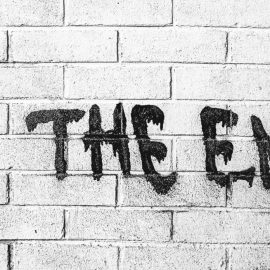

This article is an excerpt from the Shortform book guide to "The Laws Of Human Nature" by Robert Greene. Shortform has the world's best summaries and analyses of books you should be reading.
Like this article? Sign up for a free trial here .
What is short sighted thinking? How can short sighted thinking be harmful to us?
Short sighted thinking, or short term thinking, is when you don’t think through long term consequences of your action. Instead, you focus on short term benefits.
Read more about short sighted thinking and how it can lead to long term consequences.
Signs of Short Sighted Thinking
If you see any of the following four signs, you might be suffering from shortsightedness. Short term thinking can be damaging so it’s important to recognize it:
Sign #1: Nonconsequential Thinking
One sign of short sighted thinking is nonconsequential thinking. Whenever you do something, there are complicated consequences that you might not be able to predict.
- For example, in 19th-century India, venomous cobras roamed the streets of Delhi. British authorities decided this was a problem and offered a reward for every dead cobra turned in, anticipating this would lower the cobra population. Instead, locals bred cobras so they could kill them, turn them in, and make money. When the authorities realized this was happening, they canceled the bounty. The breeders retaliated by releasing all their cobras, and the cobra population increased by 300%.
If you find yourself thinking that if you do something, your action will directly lead to only one outcome, you may be suffering from short-term thinking. It’s impossible to predict all the consequences, but the best long-term thinkers consider as many outcomes as possible.
A spin-off of nonconsequential thinking is believing that if your intentions are good, the outcome will be good. This is not always the case.
Sign #2: Battles That Won’t Win the War
If you’re involved in many struggles, and none of them are going anywhere, but you don’t want to give up because you’ve spent so many resources already, this reluctance to retreat may signal shortsightedness.
Sign #3: Nervous Impatience
Another sign of short sighted thinking is nervous impatience. Today, we can get information almost instantly—news is reported the moment it breaks and we can see what’s trending on any social media platform in real time. This makes us impatient and shortens our attention spans.
If you find yourself assuming that whatever’s currently happening will continue to happen indefinitely, or reacting to moment-by-moment trends, you may be falling victim to shortsightedness. In reality, snapshots aren’t usually representative of the larger context—for example, a stock price at 10 a.m. gives no indication of what the price will be in a week or even an hour.
Sign #4: Too Much Information
The fourth sign of this law beginning to take hold of you is if you can no longer prioritize—you feel overwhelmed by the amount of information surrounding you. Knowing all the details can give you a false sense of control because you know a lot, but you don’t know what to do with it or what’s important. This short term thinking will overtax your brain and potentially lead to confusion and headaches.
- For example, King Philip II of Spain wanted to know every detail about the government, from toilet placement to clergy payment to national security. Since he never paid attention to the right information, he caused disastrous military events—in 1588, when he sent the Spanish Armada to England, he’d studied the English navy and the country’s defenses, but he didn’t check the weather reports, so storms destroyed his ships.
Being aware of your own short sighted thinking can help you recognize bad decision making and work on your long term thinking.

———End of Preview———
Like what you just read? Read the rest of the world's best book summary and analysis of Robert Greene's "The Laws Of Human Nature" at Shortform .
Here's what you'll find in our full The Laws Of Human Nature summary :
- Why it's in your nature to self-sabotage
- How you behave differently when you're in a group
- Why you're wired to want the wrong things in life






